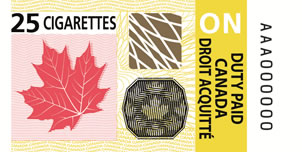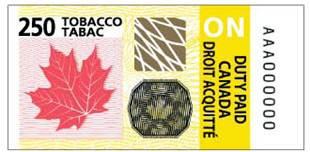We've moved this content over from an older government website. We'll align this page with the ontario.ca style guide in future updates.
Contraband tobacco
Help us improve your online experience
Take a 2-minute survey and tell us what you think about this page.
Under the Tobacco Tax Act, unless otherwise authorized, it is illegal to buy, possess, sell or distribute any quantity of untaxed cigarettes or any other untaxed tobacco products.
The presence of contraband tobacco in Ontario:
- Undermines the government's efforts to reduce smoking rates and protect children and youth from the dangers of smoking, as contraband cigarettes can be purchased for as little as a few dollars
- May generate profits that fuel other criminal activity, including trafficking of drugs or purchasing illegal weapons
- Results in a loss of government tax revenue
- Hurts local businesses that follow the law
People in Ontario can report contraband tobacco by emailing MOF.Tips@ontario.ca or contacting Ontario Crime Stoppers at
Addressing contraband tobacco
The government works with law enforcement and other partners to address the presence of contraband tobacco. These partnerships include:
- Cornwall Regional Task Force, a partnership with the Royal Canadian Mounted Police, Ontario Provincial Police, Canada Border Services Agency, and local police.
- Contraband Tobacco Enforcement Team, located within the Ontario Provincial Police's Organized Crime Enforcement Bureau, that works to dismantle contraband tobacco networks across Ontario.
- Tobacco Enforcement Grants Program, which provides incentives for local law enforcement to undertake investigations into contraband tobacco.
- Ontario Crime Stoppers operates an anonymous tip line.
- Local public health units through the Tobacco Inspection Partnership. Public health unit inspectors are cross-designated under the Tobacco Tax Act to seize and lay charges on contraband tobacco.
How to identify legal cigarettes and fine cut tobacco
Packages of legal cigarettes and fine cut tobacco in Ontario are identified by the Ontario-adapted federal tobacco stamp:


A tobacco stamp contains security features and has a yellow background with the letters 'ON' in white and in black letters the words 'DUTY PAID CANADA DROIT ACQUITTÉ'.
Because the provincial and federal taxes add up to at least $68.61 per carton of 200 cigarettes, cartons sold for less than this are likely illegal.
Subject to certain limited exceptions, cigarettes and fine cut tobacco sold in packages without a legal ON DUTY PAID CANADA DROIT ACQUITTÉ tobacco stamp are illegal.
For example, cigarette packages with a peach-coloured federal stamp may be sold at authorized duty‑free stores. Some on-reserve retailers are also authorized to buy, from authorized wholesalers registered under the Tobacco Tax Act, limited quantities of cigarette packages with a peach‑coloured stamp. These packages are to be sold only on reserves to First Nation consumers who are Indians as defined under the federal Indian Act, for their own use.
Consequences of breaking the law
Without proper authorization under the Tobacco Tax Act, it is against the law to have any packages of cigarettes or fine cut tobacco that do not have a legal ON DUTY PAID CANADA DROIT ACQUITTÉ tobacco stamp. Consequences include civil penalties, and, if charged and convicted of an offence, possible fines, jail time or both. Packages of cigarettes that do not have the tobacco stamp are unmarked cigarettes.
If you are convicted of possessing unmarked cigarettes for purposes other then resale, you may be fined up to three or four times the tax on the unmarked cigarettes you possessed plus:
- a fine of $200 if you possessed 200 unmarked cigarettes or less
- a fine of $500 if you possessed more than 200 unmarked cigarettes but less than 1,001
- a fine of $1,000 if you possessed more than 1,000 unmarked cigarettes but less than 10,001
- a fine of not less than $1,000 and not more than $50,000 if you possessed more than 10,000 unmarked cigarettes.
In addition, if it is not your first conviction for possessing unmarked cigarettes or if you are in possession of more than 10,000 unmarked cigarettes you may be sentenced to up to two years in jail.
If you are convicted of possessing unmarked cigarettes for the purpose of resale, you may be fined up to five times the tax on the unmarked cigarettes you possessed, plus a fine of not less than $500 and not more than $75,000. You may also be sentenced to up to two years in jail.
You may be subject to the most serious consequences under the Tobacco Tax Act if:
- You are found in possession of 100,000 or more unmarked cigarettes at a place used for the purchase, sale or storage of tobacco (or in transit to or from that place),
- That place is controlled directly or indirectly by you, and
- You are convicted of possessing unmarked cigarettes for the purpose of resale.
In that circumstance you may be fined not less than 5 times the tax on the unmarked cigarettes plus a fine of not less than $10,000 and not more than $100,000. You may also be sentenced to up to two years in jail.
If convicted, you will also have your name publicly released on the Ontario Newsroom.
For tobacco retailers
Tobacco retailers must:
- sell only legal tobacco products
- have a valid tobacco retail dealer's permit
- only buy tobacco products from tobacco wholesalers who are registered with Ontario. You can see which wholesalers are registered by getting the current Tobacco Tax Registrant List . Please subscribe to receive e-alerts about tobacco tax and other topics from the Ministry of Finance
- keep, records and books of account for all tobacco product purchases and sales for seven years at their principal place of business
- not sell tobacco products to a person less than 19 years old
- require ID from anyone that appears to be less than 25 years old
- post applicable health warning and age restriction signs
- sell legal packages of cigarettes and fine cut tobacco that are marked with the ON DUTY PAID CANADA DROIT ACQUITTÉ tobacco stamp.
Tobacco retailers found selling contraband tobacco may be subject to penalties, fines, imprisonment, and may be banned from selling tobacco or lottery products.
Help to quit smoking
Tobacco is the leading preventable cause of cancer and premature death in Canada. Each year, tobacco claims 16,000 lives in Ontario — that equals 43 lives every day. Tobacco kills more Ontarians than alcohol, illegal drugs, accidents, suicides and homicides combined.
Smoking cigarettes and using tobacco results in $7.0 billion in estimated direct health care costs and indirect costs annually in Ontario (Source: Ontario Health and Ontario Agency for Health Protection and Promotion (Public Health Ontario). Burden of Health Conditions Attributable to Smoking and Alcohol by Public Health Unit in Ontario. Toronto: King’s Printer for Ontario; 2023.)